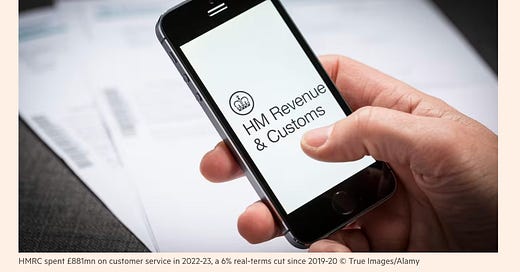A few weeks ago, I had a problem with my car getting serviced. Or more specifically, the cost.
The service was fine, good enough, did the job. But the cost was not, mainly because I was charged for it, when I thought it was included in my monthly package.
To cut to the punchline, it was user error. I’d got confused; that was the deal I had with my old car. But to find that out, it had taken me five weeks, three phone calls, and about fifteen emails.
It was just another reminder of how inaccessible many organisations have become, just at the point when we have more ways to contact them than ever before. The problem is, it doesn’t feel like organisations really want us to use them.
In fact, it feels like organisations have started to believe their aim is to exist at as low a cost as they can - not, as it should be, to give a great service to their customers, at a cost low enough to make a good profit.
With my car service, it was a full, multi-channel ghosting.
I emailed the service team, who said they’d pass it on to their booking team.
I emailed the booking team, who said they’d pass it on to the sales team.
I emailed both several more times, to ask why no-one had been in touch.
I had a call from someone, saying they’d get someone to call.
I called them back, and asked why no-one had.
I went online to find the email myself, but only had a generic ‘Contact Us’ page, which didn’t fill me with confidence.
I emailed several more times, copying in anyone else I knew at the company.
After a while, everyone just stopped replying, until eventually, an email and a phone call this morning which, given the timing of this story, allows for a happy ending.
In the understandable race to automate and streamline costs, organisations have forgotten that customers do actually pay them money to use their service and so, y’know, they should probably provide some kind of service.
This could mean making wait times shorter, not taken for granted that people are happy to spend their entire lives on hold.
It could mean taking ownership when a customer has a problem, not pushing all that effort back onto the customer
And with the world of AI Agents upon us, the risk of companies rolling something out quickly - but ineffectively - is high, so it means having a back-up, a safety net for customers to land in when the tech hasn’t helped them do what they want to do.
This lack of accessibility is why the Spanish government recently brought in a law stating that businesses must answer a customer’s call within three minutes now. No ifs, not buts. (The USA actually introduced something similar towards the end of the Biden administration, but sadly that seems to have disappeared from the White House website in Trump and Musk’s Bonfire of the Vanities).
And this is all before you start to factor in vulnerability and genuine accessibility needs. A weekend conversation with my retired Aunty and Uncle (as in, they no long work, not that they used to be my Aunty and Uncle then decided to give up) got onto the topic of their local bank branch closing down, with the next nearest five miles away.
It’s easy to challenge their slight technophobia and wariness of online banking - but then, with two of their favourite shops, M&S and the Co-Op, both in the news recently for significant data breaches, well, maybe they feel vindicated.
Ultimately, if customers pay for your products and services, they deserve to be able to speak to you if they want or need to. And if that’s too hard to do, then don’t be surprised if they go elsewhere.
After all, if your partner stopped replying to your messages, or refused to take your calls, you probably wouldn’t hang around for long either, would you?





